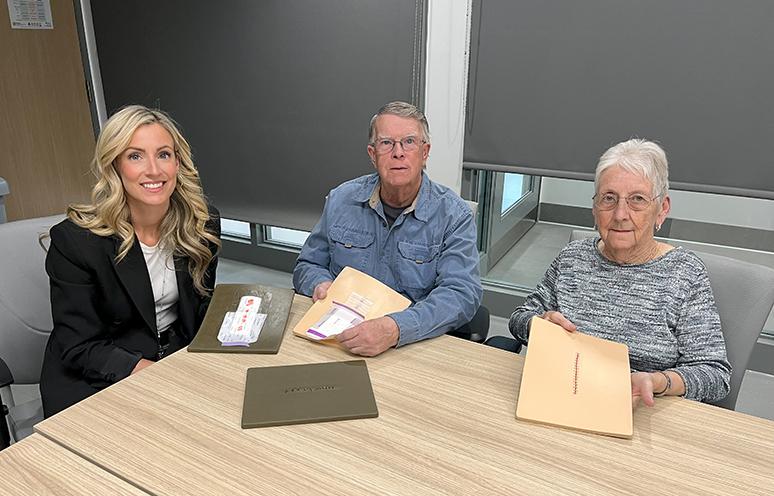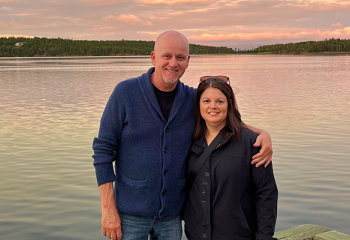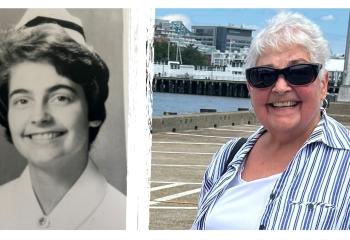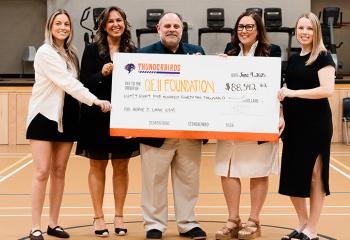
Michelle Rowicki (left), a nursing case manager with the QEII’s spine assessment clinic, leads education sessions for patients and caregivers prior to spine surgery with the help of incision care simulation boards, purchased with funds from a QEII Foundation Comfort & Care grant. For patients like Linda Mahar (right) and her husband Don (centre) — her caregiver following surgery — the education sessions play an important role in care and recovery. QEII FOUNDATION
Comfort & Care grants supporting post-op patient education
Linda Mahar of Hubley, N.S. had been experiencing progressive back pain for a few years. Her condition began to worsen, impacting every aspect of her life — from walking to daily activities like housecleaning and grocery shopping.
“I had pain in my lower back, and it went down my leg, right to my foot and causing my toes to tingle,” says Linda.
Her family doctor referred her to QEII spinal orthopaedic surgeon, Dr. William Oxner, who performed Linda’s surgery in January 2025.
As with any surgery, Linda had questions about what to expect. Her husband, Don, was arguably the most nervous as he would be Linda’s caregiver following her surgery, with her incision on her back where she couldn’t see it.
Shortly before her surgery, Linda and Don received a call from the QEII’s spine assessment clinic. They were invited to attend a pre-operative patient and caregiver education session.
Each year the spine surgical service at the QEII completes an average of 600 elective surgeries. Patients are contacted and offered the opportunity to engage in educational opportunities prior to their surgery. Through these sessions, the team hopes to bridge gaps and prevent unnecessary emergency department visits for non-emergent issues related to post-operative care.
“We know there’s a lot of stress and anxiety associated with surgery, for patients and their families,” says Michelle Rowicki, a nursing case manager with the program. “We are aiming to decrease that unnecessary stress by providing patients and their caregivers with the tools they need.”
The spine assessment clinic team has been teaching these weekly sessions since December 2023 and Michelle says they’ve had positive feedback from patients. Focused on providing education that meets the needs of all learners, Michelle and her team work to ensure that materials presented in the education sessions — such as an educational booklet and direct phone number to their case manager — are understood by patients. In late 2024, they added a new resource to their toolkit.
Funded through a QEII Foundation Comfort & Care grant, Michelle was able to purchase four incision care simulation boards.
Since 2005, the QEII Foundation has awarded $2.25 million in Comfort and Care grants to frontline healthcare teams, like the spine assessment clinic. These grants support projects that would not typically receive funding from the health centre’s operating or capital budgets.
Every year, QEII Foundation donors ensure $100,000 in Comfort & Care grants can be awarded to QEII departments – funding everything from these incision care boards to stationary bikes for dialysis patients and family room furniture, offering families and friends a comfortable space to rest.
Designed to simulate skin with a surgical incision, complete with sutures and surgical staples, these incision care boards have provided the opportunity for hands-on learning for patients and caregivers prior to surgery.
For Linda and Don, their session was a game-changer in understanding what to expect and how to care for Linda post-surgery.
“The session was great,” recalls Don. “The incision boards gave us a visual demonstration of what to expect; it definitely makes it better for people like ourselves who are going to go through something we've never experienced before.”
Michelle explains that the incision care boards also allow patients to perform return demonstrations to clarify understanding. Patients and their caregivers gain confidence when they’re able to try what they learned in front of a nurse, receiving real-time feedback before surgery.
Michelle says the incision care boards simulate different skin tones and feature different types of skin closure options, aligning with the surgical techniques of the QEII’s five spine surgeons.
“The surgeons all do the same kind of surgeries, but they may have a different skin closure method or different dressing selection,” explains Michelle. “They’re all a sterile dressing but they may look different, depending on the surgeon.”
There may also be multiple layers to a dressing, some of which the patient should or shouldn’t remove and others that they need to change.
“For people who have never had surgery or never had to care for a post-op incision, it can be overwhelming,” says Michelle. “These simulation boards have been an important tool to be able to show them what they can expect their incision to look like, and to run through scenarios of how to care for the incision.”
Now several months post-surgery, Linda is recovering well. She’s happy to be moving pain free again, getting back to enjoying life.
She and Don are grateful for both the quality of care they received at the QEII and for the fundraising efforts of the QEII Foundation.
To learn more or donate to Comfort & Care grants, visit https://qe2foundation.ca/top-priorities/comfort-care.


